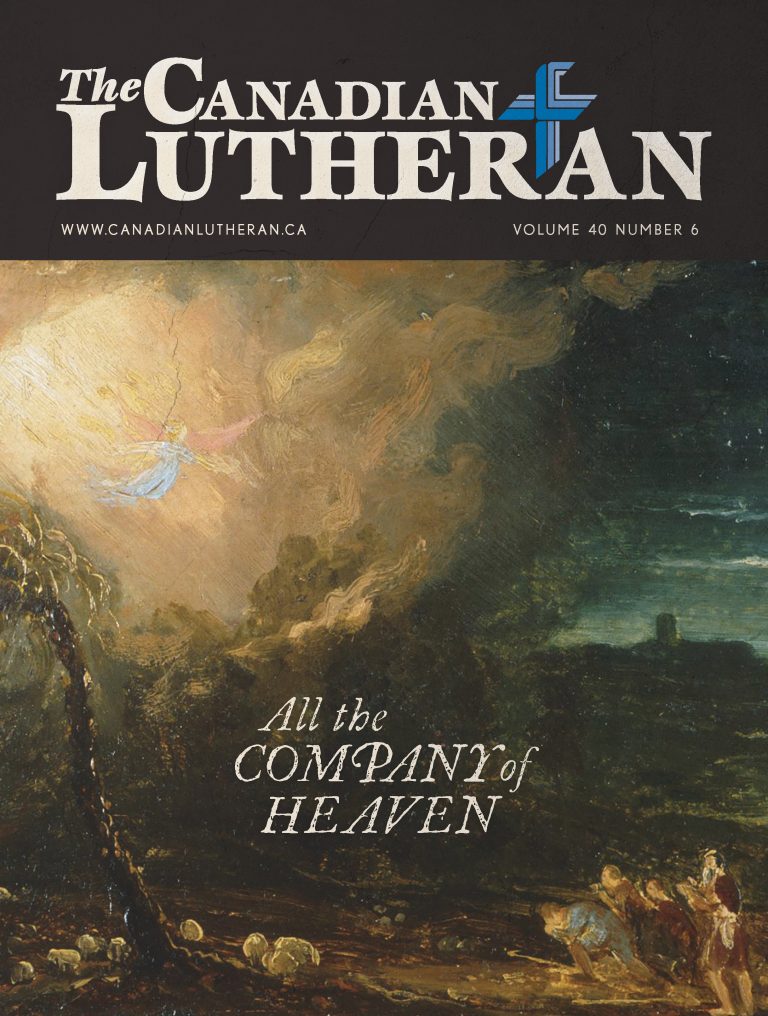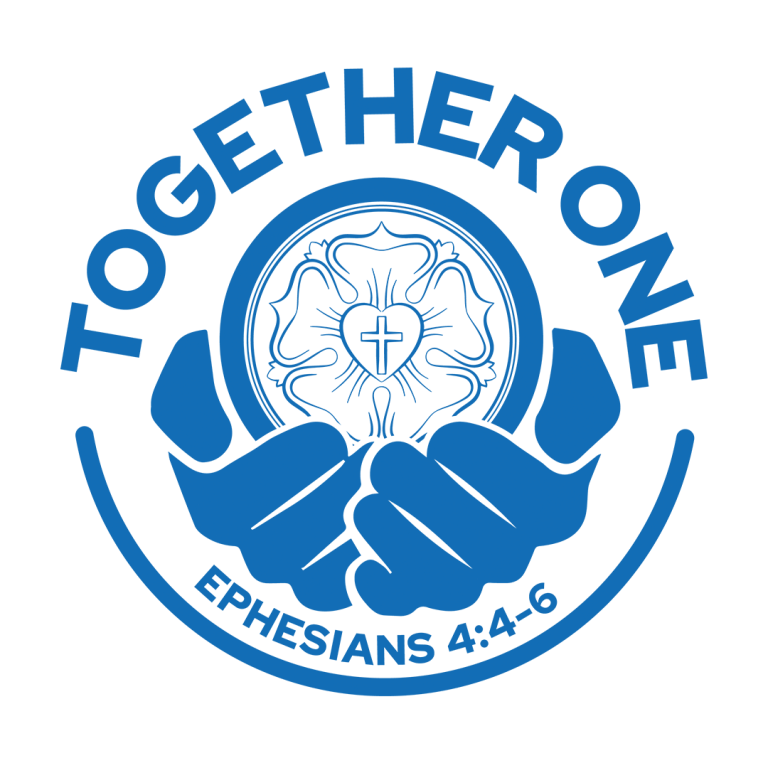Faith, Technology, and Science Fiction
 By: Bill Anderson
By: Bill Anderson
Roddenberry and Star Trek
“Space, the final frontier…” My first foray into technology was watching Star Trek in the 1960s. I was only five years old when it originally aired in 1966. But when ITV Edmonton did re-runs in 1975, I was totally hooked and obsessed. Now my wife Joan and I spend five hours a week in the deepest, outermost parts of the galaxy.
Gene Roddenberry originally pitched Star Trek to the networks as a “wagon train to stars”—picking up on the other cultural obsession with Westerns in the 50s and 60s. As I often tell my students, every artifact is a reflection of the artist’s philosophy, beliefs and values, as well as the cultural milieu in which it is created. Roddenberry was a complex man with a complex relationship to theology and religion. He grew up in a Southern Baptist home in Texas and was very involved with church activities. He later rejected the faith when he was around 14 years old.
Roddenberry has been portrayed often as an atheist. Late in life, however, he asserted that he believed in some concept of God (a form of deism) but rejected organized religion. My own analysis of Roddenberry’s philosophy is that he appears at certain points to function as an atheist but always as a secular humanist. His complex relationship with technology and theology can be seen the various manifestations of the Star Trek franchise.

Image credit: Paramount Pictures and/or CBS Studios
In the original series, reflections of Roddenberry’s atheism, or rather secular humanism, was more sublime—even though in public discourse he could be quite harsh against organized religion. This may be because it would have damaged ratings had the show overtly critized religion, since at the time religion was still well-regarded and widely practiced. Yet the concept of God or spirituality have been a mainstay of the Star Trek franchise throughout.
Roddenberry gave strict instructions that Star Trek: The Next Generation was to be thoroughly secular—that there was no place for religion, superstition, or mysticism. But Star Trek betrays subtle cognitive dissonance between science and religion: it can’t seem to get away from religion and even at times portrays it in positive ways. Star Trek Deep Space Nine (which came out after Roddenberry’s death) is a case in point: this series has an abundance of overt religion, spirituality and mysticism can be found. Generally, though, religion in Star Trek is usually portrayed as primitive, emotional and unreasonable.
Religious themes, ideas and imagery are found throughout all Star Trek series (see, for example, Ex Astris Scientia’s summary here). This relates to one of my own obsessions: non-religious artists (especially those in science fiction) who are obsessed with religion and religious themes, ideas, and imagery. Roddenberry is no exception in the Star Trek franchise. The same is true also of Ridley Scott (discussed later in this essay).
The current Star Trek series Discovery is perhaps a re-assertion of Roddenberry’s original philosophy—complete with a superficial and stereotypical portrayal of ignorant and backward Christians, as in the episode “New Eden”. Here the superiority of reason and science (scientism) is strongly asserted by the Science Specialist Burman—complete with the assertion that “technology saves all.” But even in that episode, doubt is cast upon the totality and efficacy of science and technology over the mysterious and faith, as masterfully conveyed by Captain Pike’s framing of the issues.
Roddenberry and Star Trek (and atheism in general), have a major problem to solve. Ex Astris Scientia puts it well: “The question crops up whether Star Trek’s philosophy can offer anything to replace religion?” The irony pointed out in Star Trek V: The Final Frontier is that science and quest (“voyage”) ultimately lead to a Creator God: Science and Technology intersect with religious experience.
Modernism is the broader philosophical background to Star Trek The Original Series. Rodenberry’s Utopian vision was based on the idea that science and reason could solve all of humanity’s problems. There would be no more hunger, disease or war. The point, however, is that once human beings empty ourselves of emotion—become like Spock, as it were—and base our lives and actions on reason and the benefits of technology, we will achieve utopia. Kevin Cawley at Notre Dame University has made a recent case for philosophical apathy and its benefits to humanity in his article “What the World Needs Now”—and this is a characteristic of both Spock and Data in Star Trek.
Blade Runner, Transhumanism, and Artificial Intelligence
Enter Blade Runner (1982). Phillip K. Dick’s book Do Androids Dream of Electric Sheep? was the basis for the Ridley Scott film Blade Runner, which presented a perspective on the rise of technology contrary to Roddenberry’s. Instead of technology leading to Utopia, Dick suggests, it will lead to Dystopia.
Like Roddenberry, Phillip K. Dick was a complex human being with a complex relationship with technology and theology. According to Ridley Scott, Dick was a “Prophet of Science Fiction”—and his influence in the work of Scott is evident in many of his films, as well as many other science fiction movies. Scott, however, is much less sympathetic to religion (especially Christianity) than was Dick, who was a well-known Christian mystic.
Scott grew up in the Church of England but is no fan of organized religion nor the God of the Old Testament. Indeed, his movie Prometheus is his own portrayal of a mean and vindictive Creator God paralleling Genesis 1-11 (see the documentary “The Making of Prometheus”); much in the same way he portrays God as a “mean and vengeful little kid” in Exodus: Gods and Kings. Scott is also well-known for his obsession with origins and religion—including that fact that the main character in Prometheus is a devout Christian—namely Dr Elizabeth Shaw. In Prometheus there is a clear juxtaposition of technology and theology (faith).

Image Credit: Warner Bros.
Back to Blade Runner. A theological summary of the film is a formidable task: I spend three lectures on it in my pop-culture course. Blade Runner’s dependence on Frankenstein and Paradise Lost are well-known in relation to Genesis 1-3 (see Desser’s “The New Eve: The Influence of Paradise Lost and Frankenstein on Blade Runner”). The big theological questions and problems which are explored in the film relate to theodicy (“Justice of God”) and predestination vs freewill, among others.
Burnette-Bletsch, in the Bible and Cinema, provides a broad context for Blade Runner (like Paradise Lost) wherein these theological struggles are worked out in a veritable hell reflected the opening sequence of the film. Burnette-Bletsch notes that Blade Runner portrays God the Father Creator as an arrogant scientist who blames his creatures for evil (as in Frankenstein) rather than taking responsibility for creating them as such with built-in limitations like life-span. There is a tragic quality whereby God’s creatures desire to seek their Creator and have a relationship with him, yet hate and blame God for creating them and placing them in an impossible situation. Thus like the monster in Frankenstein, Batty hates and kills his creator, the corporate giant Dr. Tyrell.
The primary theological question explored by Blade Runner is: What does it mean to be human (Theological Anthropology)? This is where technology intersects with theology in terms of Artificial Intelligence, consciousness and sentience. If Roy and Pris as replicants are in fact conscious and sentient, as their behavior seems to demonstrate, should we be killing (“retiring”) them? Theodicy again raises its head in relation to predetermined capacities and limitations by which humans or replicants are imprisoned—an issue which the Apostle Paul addresses in Romans 9-11—which still needs to be taken seriously.
The ultimate message of Blade Runner is that ultimately humanity will save themselves through technology—but it’s a message than runs squarely against biblical revelation. Ironically, the film intuitively undermines and succumbs to its own premise: technology does not lead to utopia but rather dystopia.
It is no coincidence that Ridley Scott makes a callback in Blade Runner to the Tower of Babel imagery in the 1929 classic Metropolis. Like the Fall in Genesis 3, the Tower of Babel narrative reminds us that the essence of sin is this: Pride leads to a false sense of not needing God the Creator and to Rebellion against him—that we can become “god-like” and make our own way. Ultimately a life built without God (including a properly revealed version of him) is a dead end.
Contemplating the Questions Technology Raises
Without a recognition of our sin and separation from God, life remains futile. We are left using technology to try to build our own way to heaven, to grant ourselves eternal life via transhumanism. These ideas—artificial intelligence and transhumanism—raise obvious questions about what it means to be human. What is consciousness? What is soul? What are life and death? Can technology really give us eternal life?
Transhumanism is yet another futile attempt to usurp God and save ourselves through technology. Even if we could upload our consciousness into a cybernetic body, the fatal flaw of transhumanism is that it remains subject to the fragility of our fallen world. What would happen when companies who manufacture parts go belly up or maintenance technicians can no longer be found?
Or consider the artificial eternal life transhumanism purports to offer: without God, there would be no ultimate meaning or purpose for continued existence. Or consider artificial intelligence: even if AI could achieve consciousness and sentience, it would still be subject to the effects of the Fall in Genesis 3—and consequently be in need of salvation (cf. Romans 1).
Technology is a gift from God for which I am deeply grateful. Indeed, in my own week-daily prayer liturgy, I praise and thank God “for science and technology—which show us more and more of His Glory every day.” But technology is developing faster than our moral capacity to deal with it. Theology is in a unique position to handle the issues.
Think more deeply about the relationship between theology and technology at the Canadian Centre for Scholarship and the Christian Faith’s 2019 conference Technology and Theology (May 3-4, 2019 at Concordia University of Edmonton). Find out more information here.
Rev. Dr. Bill Anderson is a pastor of Lutheran Church–Canada and professor at Concordia University of Edmonton (CUE). He also serves as Director of the Canadian Centre for Scholarship and the Christian Faith.






